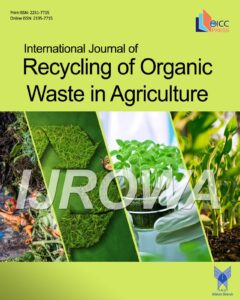Municipal solid waste compost and its derivatives, a suitable alternative to peat moss in the growth of Dracaena marginata tricolor
Authors
-
Farshid Esmaeili
*
 1
1
Abstract
Purpose This study aimed to investigate the effects of compost and vermicompost of municipal solid waste application on the growth of Dracaena marginata tricolor. Then, the results of foliar application of compost tea and vermicompost tea on the plants were examined.
Method Experimental treatments included compost and vermicompost of municipal solid waste in proportions of 50 and 70% combined with the perlite. Then we sprayed compost tea and vermicompost tea on the plants at a concentration of 10 ml. At the end of the study, the physical and chemical properties of the substrates, the amounts of macronutrients in the substrates and the plants, growth indices, as well as anthocyanin content, were evaluated.
Results The results showed that conversion municipal solid waste compost to vermicompost improved the physical and chemical properties of this material and the absorption of nutrients. Also, the vegetative indices and anthocyanin content of this plant were positively affected. Foliar application of compost tea and vermicompost tea caused higher nutrient absorption and improved plant growth indices, except for dry root weight. In general, combining 50% of the organic components of substrates with perlite achieved better results.
Conclusion Based on the findings, compost, and vermicompost of municipal solid waste are cheap and available alternatives to peat moss in the cultivation of Dracaena marginata tricolor. Also by spraying compost tea and vermicompost tea, it significantly improved the amounts of nutrients, vegetative indicators, and its appearance.
Highlights
- Converting municipal solid waste into compost is a very effective way to dispose of this waste.
- The use of municipal solid waste compost plays an important role in the growth and yield of the ornamental plant Dracaena marginata.
- Conversion of municipal solid waste compost to vermicompost improves the physical, chemical, and microbial properties of this organic fertilizer.
- Compost and vermicompost of municipal solid waste can be used as a cheap and efficient alternative to peat moss.
- Foliar application of compost tea and vermicompost tea has many positive effects on vegetative indices and anthocyanin content of Dracaena marginata.
- The use of municipal solid waste compost and its derivatives can play an effective role in the sustainable production of agricultural products.



